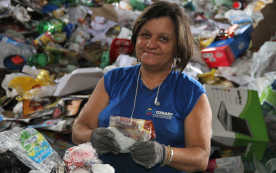Sanitation Workers Forum
-
December 2, 2021
- online @socialprotection.org @urbanpolicies.org

The working and living conditions of sanitation workers – men, women and children engaged in the handling and management of human faecal matter across the globe – are receiving increasing attention in the spheres of research, policy and practice. Sanitation workers in many countries often face a myriad of challenges: exposure to health risks; inadequate safety protections; low and irregular pay; limited access to financial opportunities; and social stigma and discrimination.
Learn about WIEGO’s work to extend social protection to informal workers
Community members, researchers, activists and policy makers are calling for improved conditions for sanitation workers; the promotion of decent work; alternative skills development; and, in some cases, rehabilitation.
Despite some global progress, hazardous and degrading forms of sanitation work persist. Knowledge gaps remain about sanitation work globally, including information about workers’ everyday lives; effective forms of intervention; health and safety best practices; and alternative livelihood options.
This forum aims to address some of these critical knowledge gaps by raising the visibility of sanitation workers and fostering discussion and collaboration in activism, research, policy and practice.
1. Share knowledge and good practices about sanitation workers globally.
2. Build a community of practice that includes sanitation worker representatives, activists, policy makers, practitioners, students and academics.
3. Discuss and prioritize areas of research, policy and practice.